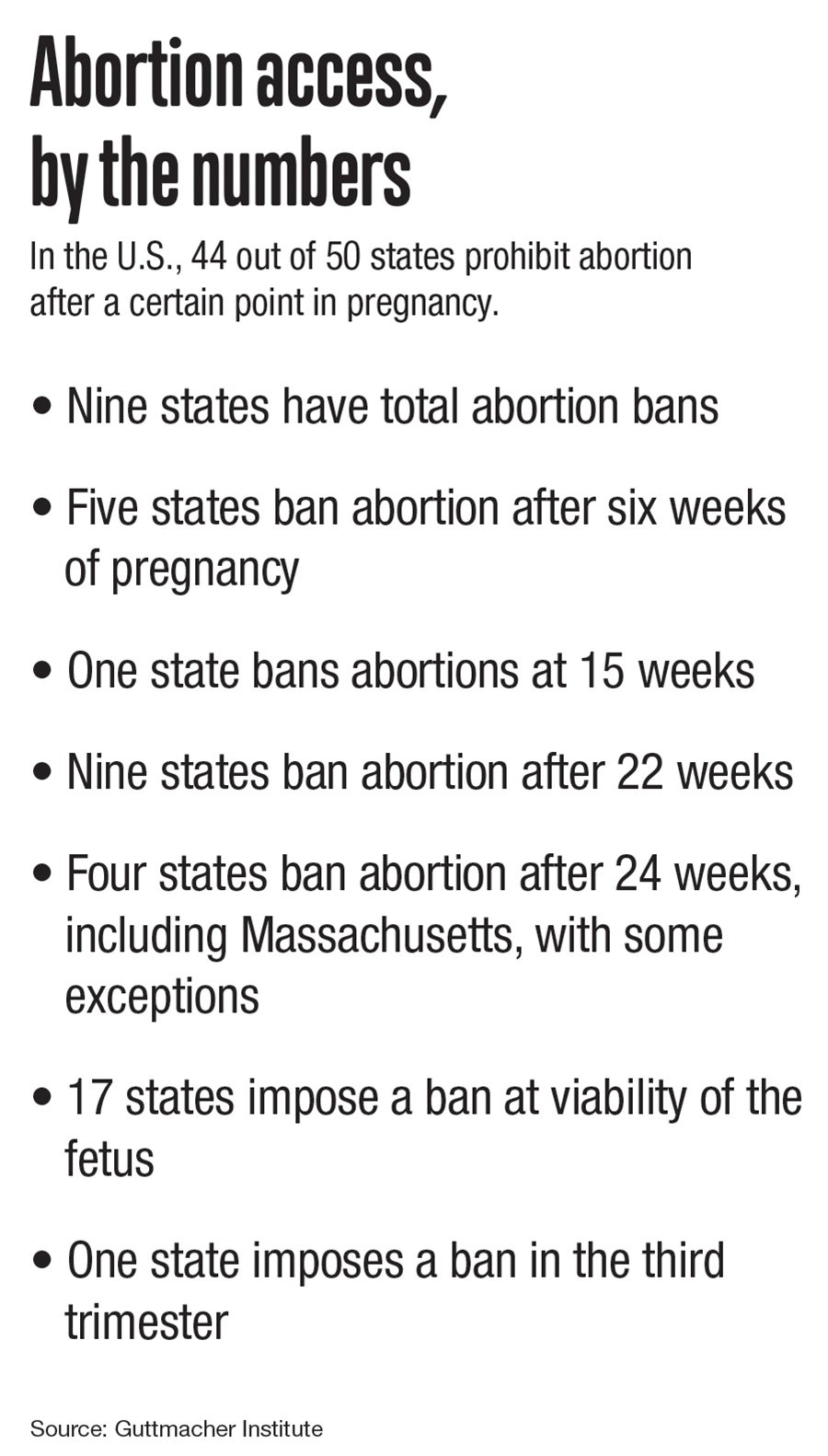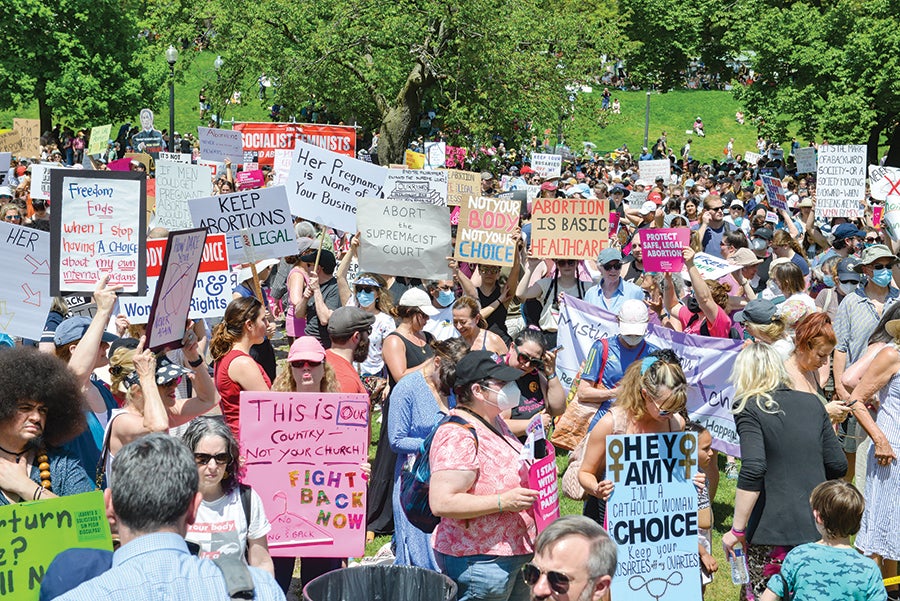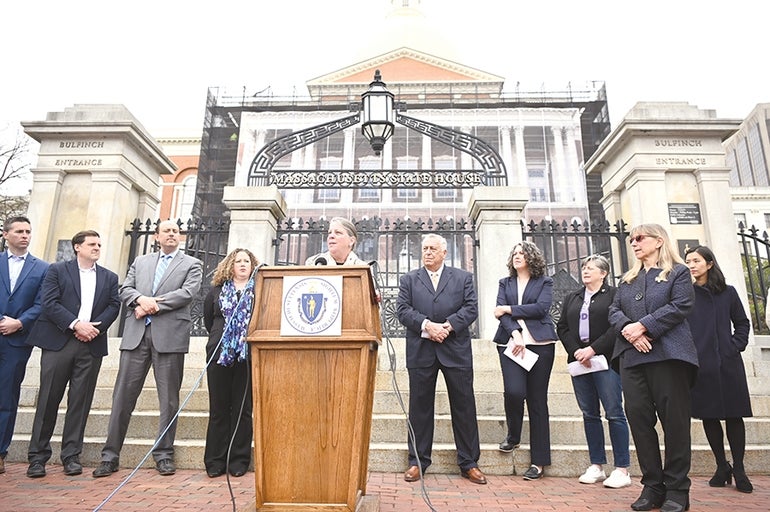Reproductive rights advocates in Massachusetts were devastated, but not surprised, when the U.S. Supreme Court officially overturned Roe v. Wade in June.
But in the weeks following the court’s decision, protections for Massachusetts patients and doctors involved in the reproductive health space have only gotten stronger.
On July 29, just over a month after the Supreme Court decided U.S. citizens no longer have a legal right to abortion, Gov. Charlie Baker signed a bill that expanded abortion access and gender-affirming care in Massachusetts.
New rights included in the law include protections for Massachusetts doctors from out-of-state prosecution, prohibiting state agencies from assisting with investigations from other states into Massachusetts doctors, and expanded access to contraception.
But even though reproductive rights protections have expanded in Massachusetts, the post-Roe legal landscape in the U.S. is hazy, complicated, and yet-to-be determined.
“It is a little bit of the wild west out there. Every state is doing something a little different,” said Jennifer Childs-Roshak, president and CEO of Planned Parenthood League of Massachusetts. “With the deeply anti-choice states doing everything from criminalization to bounty laws, it is hard to know how to protect everybody all the time, but the current law really does help provide care to people in the state.”

Legislative action
After the news outlet Politico published a draft decision of Dobbs v. Jackson Women’s Health Organization, the case that eventually overturned Roe v. Wade, the American Civil Liberties Union of Massachusetts immediately got to work.
With partners Reproductive Equity Now and the Planned Parenthood Advocacy Fund of Massachusetts, the ACLU launched Massachusetts Beyond Roe, an agenda for abortion access and reproductive equity in the commonwealth. Goals include expanding access to abortion and other reproductive health care, supporting providers and patients, and increasing research and education efforts.
Several of the Massachusetts Beyond Roe agenda items have already been implemented into legislation signed into law by Baker.
On June 24, the same day Dobbs was released, the governor signed an executive order prohibiting any executive department agencies from assisting in another state’s investigation into a person or entity receiving or giving reproductive health services legal in Massachusetts. The order protects Massachusetts healthcare providers from losing their licenses based on potential out-of-state charges.
And a month later on July 29, Baker signed into law legislation that expanded access to reproductive health care, as well as gender-affirming care. The law expands medication abortion treatment to college campuses, ends cost-sharing for reproductive health care, and affirms the protections for patients and medical professionals put forth in the executive order. Crucially, Childs-Roshak said, it broadens the requirement for legal abortions after 24 weeks.
“The Dobbs decision really unsettled the law in a lot of ways. A lot will be tested over the next few months and years as to what one state can dictate in another state,” said Carol Rose, executive director of the ACLU of Massachusetts. “But because we passed this bill in Massachusetts, we are able to protect people who come to Massachusetts seeking abortion care.”
The victory of getting the law signed was major, Rose said, and public officials involved should be thanked. But at the same time, the ACLU field team made sure that people could gather on the Boston
Common and in other public parks to express their frustration and outrage over the Supreme Court’s decision.
“We believe in the importance of using the marketplace and public spaces for people to have the opportunity to express their feelings and beliefs to the government,” Rose said. “We wanted to make sure there was an outlet for that, so people could do that peacefully and allow their voices to be heard.”

Response: Money & volunteers
Vikky Angelico, board president of the Jane Fund, the abortion fund serving Central Massachusetts, said the Dobbs decision served as a sort of awakening.
“There was a lot of shock and surprise and horror, and I think a lot of despair; but a lot of energized despair,” Angelico said.
Immediately following the ruling, donations started surging into the Jane Fund, as did volunteer applications.
The same is true at the Eastern Massachusetts Abortion Fund, which has seen donations from the local community and through the National Network of Abortion Funds, board member Margaret Batten said. Batten said she is concerned, however, abortion funding could just be the hot topic right now, and donations will fade over time.
“I feel confident about our ability to meet the need right now, but people are going to need abortions next year and the year after that. Abortion bans don’t eliminate the need for care,” Batten said. “I worry that people will over time lose interest. That’s why monthly donations are terrific. We need to keep people engaged on the issue.”
Some of the money flooding into the Jane Fund is coming from out of state, Angelico said. She thinks this is because websites like ActBlue allow donations to be split among multiple charities. But, she said, it could be because abortion laws in Massachusetts are pretty clear, whereas funds in other states like Texas might be facing an uncertain future.
Even in Massachusetts, however, there are plenty of legal issues to sort out. Angelico and Batten both said their abortion funds are getting pro bono legal advice from established firms to navigate the new legal waters and mitigate risk. For example, all work must be done within the borders of the commonwealth – working remotely from another state will not jive in the current environment.
“We are aware that there is some unavoidable risk. We will be watchful as things unfold,” Batten said. “I’m confident that there will be a slew of lawsuits between states on how to work out novel legal issues, so we’ll rely on good counsel from our lawyers.”
The abortion issue opens up a whole separate legal minefield, and that is the issue of privacy, Rose said.
“What’s happening now with reproductive justice battles across the country, we’re able to see how important consumer and data privacy is,” she said. “Data that arises from our search words, if they give those over to governments that would prosecute us, that’s a sign we need to do more as a society to have biometric privacy.”
Politics
According to the latest data from the Pew Research Center, 61% of Americans believe abortion should be legal in all or most cases, and 37% think it should be illegal in all or most cases.
The first abortion ballot measure after Roe was struck down turned out to be a major victory for pro-choice advocates. In an Aug. 2 election in Kansas, 59% of voters said no to a ballot question that would have amended the state constitution to remove protection of abortion rights, according to election results reported by the New York Times.
What this says, Rose said, is most people believe the government should not be involved in people’s healthcare decisions. She said that means pro-choice positions will be popular in this year’s midterm elections.
“People can disagree on what’s right and wrong, but we should make our own decisions. That’s a
message that resonates regardless of partisan persuasion,” she said. “The people of Kansas rose up and said, ‘It’s not a partisan issue. It’s a personal autonomy issue.’”
Even as some states continue to uphold abortion rights, Batten said it’s important to remember legality and access are not synonymous.
“It bears repeating that the same people who face discrimination in other areas of life – particularly those who are Black, indigenous, people of color, those who are undocumented, people living with disabilities or in rural areas, young people, and people struggling to make ends meet – face greater hurdles in accessing abortion care and health care generally,” Batten said. “We need to work harder to reach those people with the message that abortion funds are here to help with financial and logistical support.”

